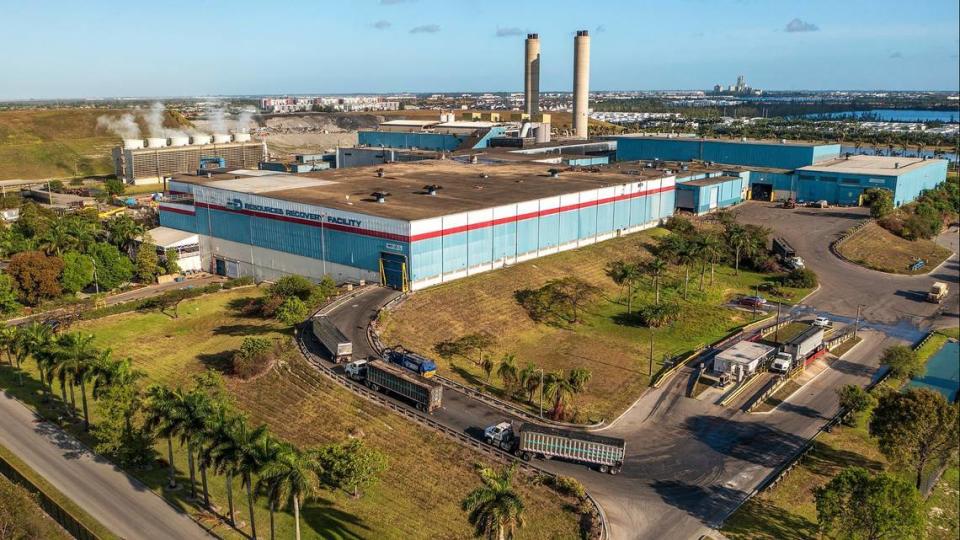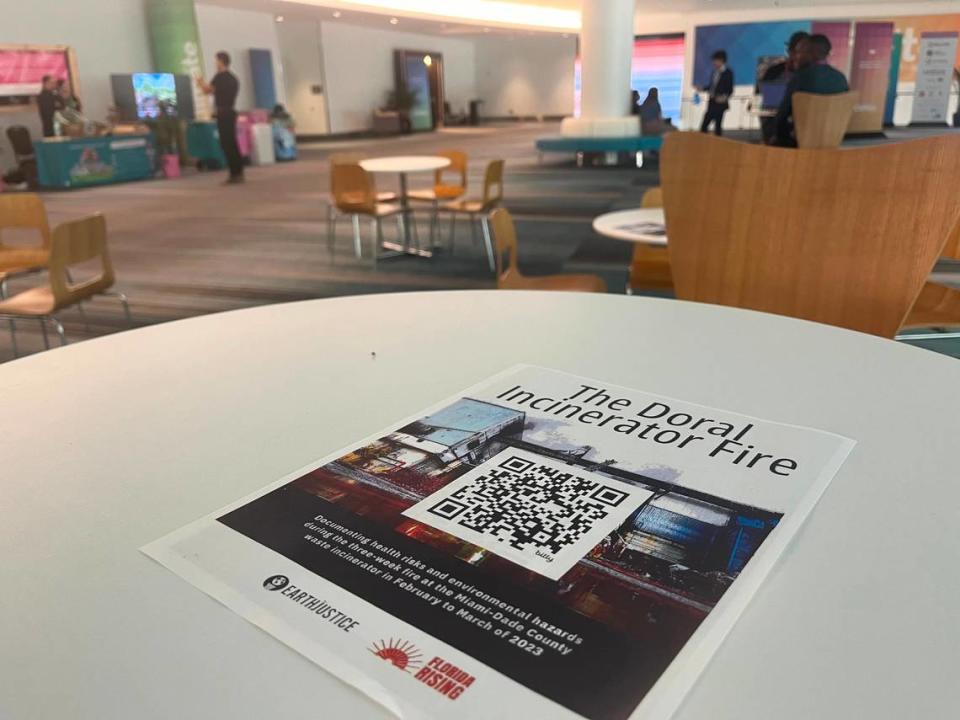Activists protesting new Miami-Dade incinerator kicked out of climate conference. See video
A local fight spilled onto the stage of a high-profile climate conference in Miami Beach on Wednesday as activists disrupted a panel on climate emissions over concerns about Miami-Dade’s plan to build a new trash incineration plant.
The focus of their ire was Tequila Smith, executive vice president and chief sustainability officer at Covanta. The firm operated Miami-Dade County’s waste-burning facility up until last year, when it burned down. Now, the county is in talks with Covanta to build and operate a new plant at a location yet to be decided.
“Clean air, no Covanta!” MacKenzie Marcelin, climate justice director for Florida Rising, said as he stood in front of the stage with other activists, holding a large green banner that read “clean air on every block #Zerowaste”. “These are false solutions.”
Marcelin and other activists were escorted from the building by security and their badges for the event, Aspen Ideas: Climate, were confiscated.

Smith, and others on her panel, were there to discuss less-talked-about solutions to cutting emissions, like better forms of agriculture or, in Covanta’s case, capturing and selling the energy from burning garbage and using it instead of burning fossil fuels.
Covanta’s trash-burning facility in Miami-Dade handled half the county’s daily trash until it burned down last year, leaving the county scrambling for a temporary trash fix. The rest made it into landfills, which are widely considered the most climate-unfriendly way to handle trash. Trash burning is a key part of the county’s climate action plan, and in the state of Florida, energy produced from burned garbage is considered renewable, on par with solar power.
READ MORE: Burning garbage vs. leaving it in a dump: Which is better for climate change?
But advocacy groups like Florida Rising say they don’t see it as a safe solution, or a green one. They worry about the health impacts from burning garbage and filling the air with smoke and particulate matter. They’d prefer the county pursue a robust compost and recycling plan instead.
As of last summer, the county was considering a few locations for a new plant. Mayor Daniella Levine Cava wants to move it to a Miami-Dade-owned airfield several miles from the Everglades, and the backup location options are in Doral and a third possibility near the current incinerator in Medley.
Florida Rising has spent years organizing against the plant, which was located in Doral, where residents frequently complained about the stink.
“I feel like we were able to make our statement and voices clear,” Marcelin told the Miami Herald. “We said it loud and proud.”

The disruption was unusual for Aspen Ideas, an event built around cordial panels and presentations. And it didn’t end there. During the question and answer section at the end, Maria Lopez Nunez, an advocate with the Ironbound Community Corporation in New Jersey, where another Corvanta incinerator plant is located, said it was “disturbing” to see local advocates get thrown out instead of being invited to join the conversation.
“It’s not that incinerators are all bad, we haven’t come up with another solution. But where they’re located and their compliance records are really bad,” she said. Lopez Nunez noted that the Covanta plant in Newark, N.J., has had 800 violations in the last seven years. “That doesn’t speak of compliance.”
Smith, the Covanta representative, thanked the advocate for her question and said she welcomes an open dialogue with the community and activists.
“We go to the community and say what do you want?” she said. “Nine out of ten times they say we want jobs, we want help with our schools. If you’re going to be in our community you have to partner with us.”
Some residents do bring up concerns about air quality, Smith said, and they’re open to discussing solutions.
“You will never hear us say shut it down,” she said. “In order for us to fix it, we have to come together.”
But Marcelin with Florida Rising said he didn’t see it as a balanced conversation and wished community activists had been offered a seat on the panel.
“There is a disconnect with Aspen and who they connect as climate leaders,” Marcelin said. “We had to stage an action in order to be heard.”
As the panelists left the stage to applause, Florida Rising Executive Director Andrea Cristina Mercado stood up and started loudly explaining how the incinerator fire last year had the plant burning for three weeks, “poisoning our community.”
“You can’t lie and pretend there’s not a profit incentive for you to burn all of the trash,” she said. “70% of what you’re burning is compostable, recyclable.”
As event staff played music louder and louder, Mercado was also removed by security, and her badge also was confiscated.
Ashley Miznazi is a climate change reporter for the Miami Herald funded by the Lynn and Louis Wolfson II Family Foundation in partnership with Journalism Funding Partners.

